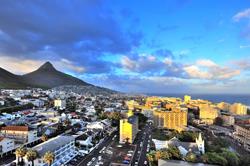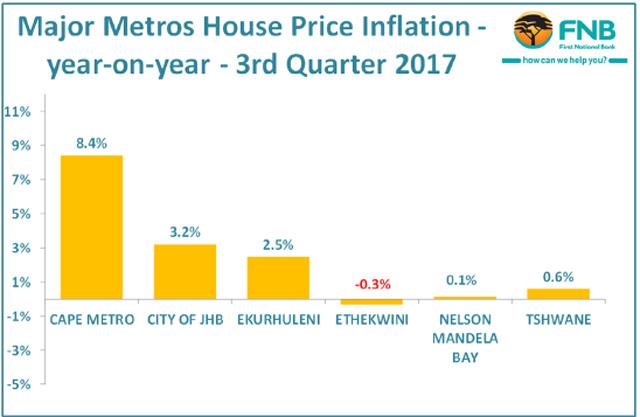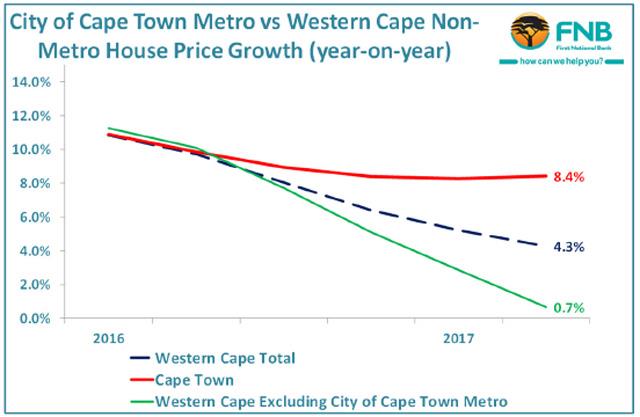Cape Town’s property market continues to “defy gravity” showing a quarterly year-on-year house price growth rate of 8.4%, well above the country’s other major metro areas.
 Cape Town’s property market continues to “defy gravity” showing a quarterly year-on-year house price growth rate of 8.4%, well above the country’s other major metro areas.
Cape Town’s property market continues to “defy gravity” showing a quarterly year-on-year house price growth rate of 8.4%, well above the country’s other major metro areas.The latest findings of the FNB House Price Indices for Major Provincial and Metro Regions show that while overall, price growth in Western Cape has slowed for the third consecutive quarter registering 4.3% year-on-year compared to the second quarter’s revised rate of 5.2%, it is now significantly slower than the 11.1% revised multi-year high recorded in the first quarter of 2016.
This means that for the first time since late 2013 the Western Cape no longer has the fastest growing house price index, with KwaZulu-Natal registering a slightly faster year-on-year growth rate of 5.0% in the 3rd quarter of 2017.
John Loos, household and property sector strategist at FNB Home Loans, says this may come as a surprise to some, given that FNB recently rated the eThekwini Metro (Durban and surroundings) housing market as “very weak”, but the relative strength in KZN appears to be more outside of the metro, while in the Western Cape the relative weakness was outside the City of Cape Town in the country regions.
When looking at the quarterly year-on-year house price growth rates for SA’s 6 major metros, Cape Town continued to show strength while eThekwini “remained in the doldrums in the 3rd quarter with a lowly -0.3% slight negative growth rate”, says Loos.
When excluding eThekwini Metro, the average year-on-year house price growth in KZN was 6.8% in the third quarter, says Loos, which is above the province’s average and explains the overall higher growth rate.
Western Cape price growth cooling off
Loos says slowing house price growth in the province was expected as the rate of growth has caused "mounting affordability challenges", but the metro has still seen good growth this quarter off a multi-year high of 11.3% in the 1st quarter of 2016.
On the other hand, many non-metro towns dependent on agriculture have suffered severe drought, while fires have caused massive damage in Southern Cape areas. This may constrain the pricing power of home sellers as buyers become more cautious, says Loos.
While the the Non-Metro Western Cape index hasn’t registered average price decline, he says the year-on-year growth had slowed to 0.7% by the 3rd quarter of 2017, after starting last year at 11.3% growth, virtually the same as the metro.
Loos points out that in tougher economic times, holiday-home buying may also decline, giving the metro an advantage over coastal towns.
“It is important to note that we are not yet talking about average house price decline in the Western Cape Non-Metro regions but about price growth ‘flattening out’ after a strong run in recent years,” says Loos.
Gauteng house prices may be due for a ‘slight lift’
The Gauteng price index was still slow, showing a year-on-year price rise of 1.3% in the 3rd quarter of 2017 compared to the last quarter's 1.2%.
Gauteng’s three metros have the lowest average time for homes on the market, according to recent FNB Estate Agent Surveys and are arguably the most “price realistic”, or closest to market equilibrium, of the major metro housing markets, says Loos.
“It is conceivable, therefore, that while we anticipate slowing house price growth in the Western Cape in the near term, after that province’s strong run, Gauteng house price growth may just start to improve slightly,” he says.
SA house price growth to remain in single digits
The FNB index shows that cumulatively, over the past 5 years, from the 3rd quarter of 2012 to the 3rd quarter of 2017, the Western Cape’s house price growth has far outpaced the other major regions, rising by 50.4%, with KZN recording 29.9%, Eastern Cape 26.8%, Gauteng 22.6% and the 5 Smaller Provinces 20.3%.
No “fireworks” are anticipated in any major provincial region in the near term, says Loos, with national house price growth forecast to be in lower single digits and none of the major regions expected to deviate too far from the national average.












